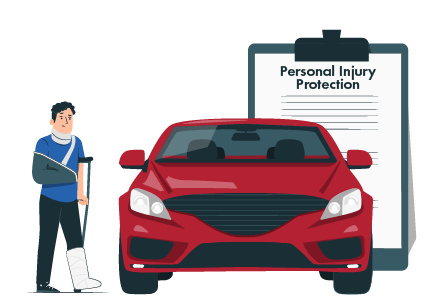Personal Injury Protection (PIP) coverage or "no-fault insurance" covers medical bills and related expenses from an auto accident regardless of who the at-fault driver was. Suppose you get hurt in a car accident. In that case, PIP insurance will pay for medical and hospital expenses not covered by your health insurance.
What is Personal Injury Protection (PIP)?
Personal Injury Protection (PIP) or "no-fault insurance" is a part of your auto insurance policy that covers healthcare expenses after an auto accident. This coverage applies to the policyholder and the passengers, even if some do not have health insurance.
Health insurance will kick in if medical expenses exceed your auto policy's PIP limits. Each policy has a per-person maximum, which means the insurance coverage has limitations to a specific amount per person injured in the accident.
Personal Injury Protection insurance is mandatory in many states. According to the Insurance Information Institute (III), many states introduced "no-fault" auto insurance in the 1970s to simplify determining fault in motor vehicle accidents.
What does Personal Injury Protection (PIP) Insurance Cover?
Personal Injury Protection insurance pays for medical bills and related expenses if you are the injured person in a car accident, regardless of who is at fault. In some states, this is called "no-fault" insurance because the insurance company pays even if you caused the accident or if no other drivers were involved.
Personal Injury Protection coverage goes beyond automobile accidents. For example, suppose you are hit by a car while walking or biking. Your auto insurance company will pay for the injured party's medical costs in that case. It will also sometimes pay for lost wages, essential services, and funeral expenses.
Medical Bills - Personal Injury Protection covers all medical treatments and services for accident-related injuries. This includes hospital bills, doctor visits, medical and surgical treatment, rehabilitation costs, and dental and optometric care if the injury affects teeth or vision. Transportation to medical providers, ambulance, and nursing services are covered, as are prescribed medications, medical supplies, and prosthetic devices needed for recovery. PIP will also pay your health insurance deductible if you exceed your medical coverage level, so you don't have to pay out of pocket for medical care.
Lost Wages - Personal Injury Protection will pay for lost income if an accident prevents you from working. This coverage for lost wages applies whether you are employed or self-employed. For business owners, your auto insurer will also pay for temporary help to complete tasks while you recover.
Essential Services - When accident-related injuries prevent you from doing household tasks, Personal Injury Protection will pay for substitute services. These additional expenses can include hiring a cleaning service to take care of your home, paying for child-care expenses if you can't care for your children, or paying for other household responsibilities you would typically do.
Funeral Expenses - If accident-related injuries result in death, Personal Injury Protection will pay for funeral services, including burial or cremation expenses. In addition to paying these burial expenses, PIP will pay death benefits, replacing income for dependents financially dependent on the deceased.
PIP pays for all medical costs (including your health insurance deductible), lost wages, essential services, and funeral expenses.
The Limitations of Personal Injury Protection (PIP)
Personal Injury Protection (PIP) coverage pays for medical expenses and related costs from an auto accident for the driver and passengers. But this type of coverage doesn't pay for non-injury-related costs or damages.
Personal Injury Protection doesn't cover damage to your vehicle, except in Delaware. If your car gets hit by another vehicle, collision coverage will help pay for repairs. Under PIP, your insurance carrier doesn't cover car theft; comprehensive coverage will replace a stolen car.
PIP does not cover injuries from driving for work (like rideshare or delivery). No-fault insurance doesn't cover damage to another person's vehicle or property. If you cause an accident and are responsible for property damage, your property damage liability insurance will pay for repairs.
PIP does not cover medical expenses above your policy limits. If your medical costs or lost wages exceed those limits, they won't be reimbursed by your no-fault insurance. However, some no-fault insurance states have exceptions. Suppose another driver causes severe injuries or your medical expenses exceed a certain threshold. In that case, you may be able to sue for additional costs.
Is PIP Mandatory by Law?
Personal Injury Protection insurance requirements depend on your state's auto insurance laws.
PIP coverage is required in no-fault states where each driver is responsible for their medical bills after an accident, regardless of fault. Drivers in these states must comply with at least the state's minimum PIP coverage.
As of now, PIP is required in the 12 states listed below.
Delaware
Hawaii
Kansas
Massachusetts
Michigan
Minnesota
New Jersey
New York
North Dakota
Oregon
Utah
Even in states where PIP is not required, many drivers add it to their policy for extra protection.
How to Add Personal Injury Protection (PIP) Coverage
Suppose you've been in a car accident. In that case, you might be unsure of the process to file a claim and get your Personal Injury Protection (PIP) benefits. Dealing with the aftermath of an accident is overwhelming, so seeking professional help can be a good idea. An attorney can help you with the claims process and get you more money.
To use your PIP benefits, medical treatment must be received within 14 days from the date of the accident. Your insurer will deny your claim if you don't get treatment within this timeframe. While an attorney can advise you on ways to get reimbursement beyond this 14-day window, those cases may have to go through the at-fault driver's insurance.
To file a claim, you must contact your insurer and provide details of the injuries and medical treatment documentation. Request itemized medical bills from your healthcare provider to make the claims process more manageable. These itemized bills will give you a clear breakdown of medical expenses, making it easier for the insurer to process your claim.
If your claim is uncomplicated, you'll be paid within 30 days from the date your insurer receives all the required documentation, including written proof of injuries and medical expenses.
PIP and No-Fault Insurance Facts
12 U.S. states have no-fault auto insurance, including Florida, Hawaii, Kansas, Kentucky, Massachusetts, Michigan, Minnesota, New Jersey, New York, North Dakota, Pennsylvania and Utah.
Some states initially had no-fault insurance laws but have since repealed them and returned to a tort-based system. States that have done so include Colorado, Connecticut, and Georgia.
Florida has the highest auto insurance rates in the U.S. The state is third in the most expensive auto insurance rates, with residents paying up to 50% more than the national average.
A 2011 Office of the Insurance Consumer Advocate report estimated that insurance fraud related to no-fault policies costs Florida residents nearly $1 billion annually in a "fraud tax." This contributes to the state's high cost of PIP insurance.
How Much Personal Injury Protection Coverage Do You Need?
The minimum Personal Injury Protection coverage—if applicable—varies by state. If you live in a state requiring PIP, you must have at least the minimum coverage limit.
But even in states where PIP is optional, having it is a good idea. Not having PIP coverage puts you at financial risk, as you'll have to pay medical bills out of pocket.
You can adjust your PIP limits with your auto insurance company to fit your needs. For example, the minimum PIP coverage in Oregon is $15,000 per person. If you don't have health insurance or want more protection, consider increasing your PIP limits.
Ultimately, the amount of PIP insurance coverage you should purchase from your insurance carrier depends on your situation and risk tolerance.
How do PIP and No-Fault Claims work?
In states that don't have no-fault insurance laws, Personal Injury Protection claims are handled like this:
If someone else hits you: The at-fault driver's bodily injury liability insurance coverage will compensate for your medical expenses but only up to the limits on their policy.
If you hit someone else: If you have medical payments coverage on your policy, your medical payments coverage will pay for your medical bills but only up to the limits you chose.
Get a Car Insurance Quote with Personal Injury Protection Insurance
For more information about personal injury protection, call 888-949-6289 to speak with an insurance agent or get a car insurance quote online today.



